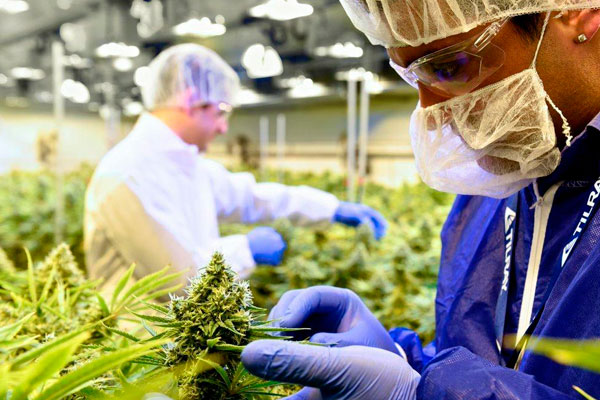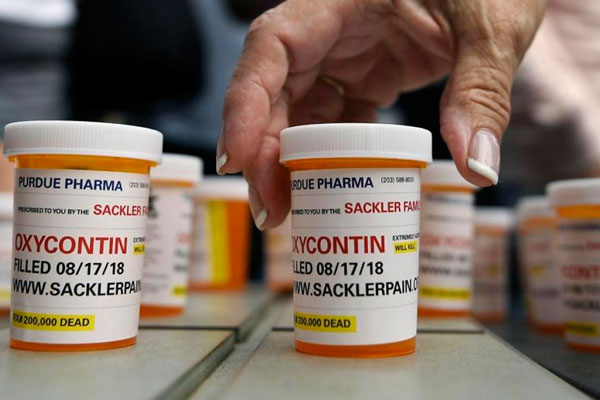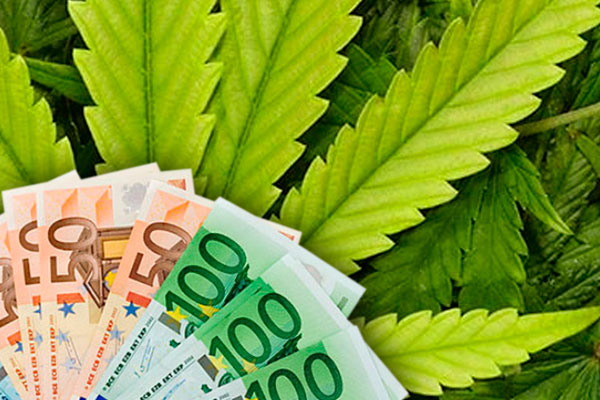A Marxist position in a key debate for the youth
"Of course, they are businessmen, entrepreneurs. The people who run the drug trafficking are no different from the rest but have more business iniciative and less concern about harming others. In that sense, they are more irresponsible. But they have a business and try to get as much as they can."[1]
That Milton Friedman, guru of neoliberalism and the anti-worker offensive led by Reagan and Thatcher, so frankly addressed the role of drug traffickers offers a clear vision of the enormous economic interests at stake in the debate over the legalization of marijuana and cannabis.
From his perspective, of his class and his system, any source of profit is legitimate regardless of its social consequences. More when it is, as in this case, one of the most lucrative businesses in the world. The problem begins when the political left assumes these ideas and presents drug legalization as a solution for the problems of the youth.
Why now?
That is what we have been experiencing in Spain during the last months. With youth unemployment overwhelming high; mental illnesses becoming an epidemic for millions of young people; scandalous rises of housing rents that denies us the right to a dignified life, and with an intensifying campaign of criminalization of the youth… a political and media offensive has unleashed to convince us of the enormous benefits of the legalization of cannabis.
All left parties with parliamentary representation, except PSOE, are in favor of legalizing the cannabis business for "recreational" use[2], that is, to get it in the same way that can be buy and consume alcohol.
The news has filled with euphoria the networks of drug traffickers, has unleashed the applause of newspapers such as El País, and many businessmen have declared themselves willing to help to transform Spain into an economic power in production, distribution, and marketing of cannabis with an assured success.
For working-class youth and families there is a question mark if are any reasons for celebration. Can we say that the possibility that cannabis use, which is already huge in our country, increases exponentially is good news?
Cannabis management is getting ready
Jesús Rodríguez, a columnist for the newspaper El País, explains it very clearly: "Nobody wants to miss the green gold rush. We are no longer talking about dealers selling homemade marijuana or hashish but about a new economic sector that has already 75 million consumers and begins to have geneticists, chemists, logistics, accountants, lawyers, communicators, lobbies, and investment funds. Forget the stoners; the suits have arrived."[3]
And he is right. According to different studies, legalizing the sale of cannabis would turn into a business of almost 500 billion dollars worldwide in just four years and tens of thousands in Spain.

In less than five years, the production of marijuana and cannabis could become one of the leading legal industries in the country, with the forecast of listing on the stock exchange with capitalizations higher than many of the values of the Ibex35. There are already large corporations such as Coca-Cola or Philip Morris -the largest tobacco company in the world- that are taking positions in this new sector.
In addition, becoming Spain a legal supplier of cannabis would be strategic for the industry opening a channel free of administrative obstacles from North Africa -the main point of cultivation worldwide- to Europe, where the world's largest legalized cannabis market will supposedly developed.[4]
To legalize cannabis would facilitate and encourage its use at a time of great despair among our class. While our neighborhoods suffer unemployment, poverty, and savage exploitation, and skepticism and frustration is spreading among the youth, proposing marijuana consumption as a solution is simply a fraud. Increasing the use of alcohol or marijuana will not solve the problems we face.
The hypocrisy of the ruling class has no limit. The same people that denounce young people for drinking on the streets encourage the legalization of marijuana. That is the essence of the matter.
This is not an abstract moral question. The consumption of hashish and marijuana is a social reality, as it is alcoholism, a hidden but massive disease that gives big profits to the bourgeoisie and serves as a tool for social control and collective demoralization.
Supporting, defending, and encouraging these types of solutions to hide the problems of millions of young people from working families is not an option. Of course, blaming the youth for consumption, and fining and persecuting those who smoke a few joints on weekends, is simply a portrait of the rottenness of the morality of the dominant class.
In this context of social decomposition drugs find an ideal field to become an alternative, not of "recreational leisure" but to withstand social disaster that we suffer.
Just take a look at the US, where marijuana production in states like California has already become the first industry and the consumption of heroin and other opioids is causing one of the greatest massacres in history[5]. Of course, pharmaceutical companies are doing a formidable business thanks to the prescription of highly addictive pills and marijuana, whose sale is regulated already in many states.

"Legalization" has led to an increase in hospital admissions, visits to emergency services, and an aggravation of mental problems directly related to cannabis use.[6] Are these policies what they want to encourage in Spain?
The myth of legalization and control of capitalist markets
"Only if the market is regulated can it be controlled," says ERC deputy Marta Rosique[7] - another great defender of the legalization of cannabis. These politicians don't see what happens with "regulated" market of electricity or of real state? Just look at the price of electricity and rents. In this case, it is even more dramatic because we are talking about the health and lives of thousands of people.
Capitalist "market regulation" is a utopia, but many reformists defend it as a panacea against monopolies. Under this system, drugs are just another integrated commodity in international production and distribution chains. The ruling class will always try to extend it´s distribution to increase their benefits which, in social costs, will generate thousands of new addictions.
Legalization does not attenuate the internal tendencies of capitalism. On the contrary, it formalizes the relationship between the State apparatus and the drug traffickers, transforming them into respectable businessmen who will legitimately sell just another product.
But this product is a corrosive poison that poisons our neighborhoods, plunging them into marginalization and violence. The legal technicalities and the repression of the bourgeois state are completely sterile in the face of this cancer. This problem just can be faced with the organization and the struggle of the oppressed to transform society.
Someone should remind the comrades of UP, ERC, Más País, and Bildu that drug traffickers have always acted under the protection of capitalist institutions and laws. They are not a group on the fringes of the ruling class but a part of it. It is impossible to manufacture the current quantities of drugs without the pharmaceutical companies providing supplies or without the main banks collaborating in money laundering.

The cannabis business chain begins in the Rif Mountains crops but ends in the Managements boards of the Ibex35 and large banks. A relationship that requires the complicity of the State apparatus. The arrest of the whole anti-drug squad in Mérida[8] is the latest example of an endless list that implicates police officers, judges, and political officials in drug trafficking.[9][10]
A revolutionary working class alternative
For Marxists, the drug problem is not a moral or legal question. We have a revolutionary perspective based on the idea that everything that serves the oppressed to advance in the struggle for their liberation is progressive. It is necessary to understand the social role that drugs play under the capitalist system we want to overturn and its effects on our class. Drugs are not only economic gains for the capitalists, but also a weapon for social control to segregate, divide and assimilate the youth and workers.
Those who advocate the legalization of drugs as a solution should understand this. The struggle of our class, the working class, is for freeing ourselves from the destructive barbarism imposed on us by capitalism, where toxic and alienating role played by drugs is fundamental. The fight against drug addiction is a task that can only be solved by the working class and the oppressed in an organized way.
Both repression and legalization have proved powerless because the capitalist order feeds economically and socially on this scourge. We need a revolutionary program that expropriates the fortunes and wealth of the narcos and the banks that support this business to invest in plans for care and rehabilitation of drug addicts and to improve our living conditions with decent leisure, culture, and education.
[1] “La gente que lleva el tráfico de drogas (por supuesto, son empresarios, emprendedores) no son distintos del resto, excepto en que tienen más iniciativa empresarial”
[2] Cuatro partidos intentando regular el cannabis de uso adulto y un muro llamado PSOE
[3] Cannabis, el negocio millonario que apunta a convertirse en el pelotazo del siglo
[4] El gigante del cannabis en EEUU entra en España con la compra de una empresa con licencia para cultivar
[5] La sobredosis de opiáceos ya es la primera causa de muerte evitable en EEUU
[6] Marijuana and acute health care contacts in Colorado
[7] Cuatro partidos intentando regular el cannabis de uso adulto y un muro llamado PSOE
[8] Detenidos todos los policías del grupo de estupefacientes de Mérida en una operación antidroga
[9] "Euskal-fariña": un libro de investigación relata la historia del "narco-oasis vasco"
[10] Nacho Carretero: “En Galicia todavía hay tolerancia con el dinero que venía del narcotráfico”





















































